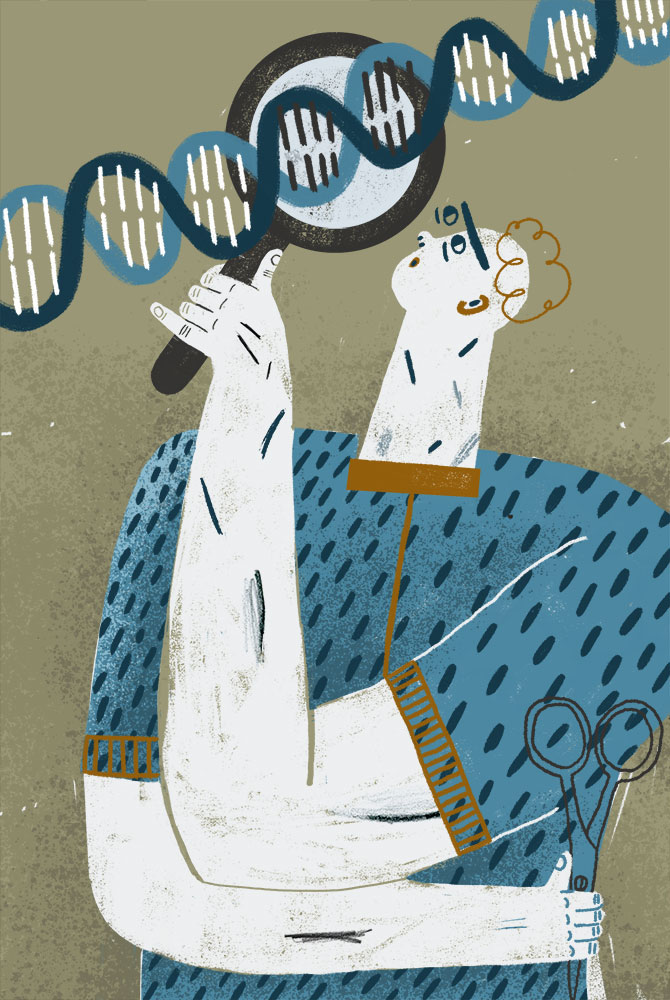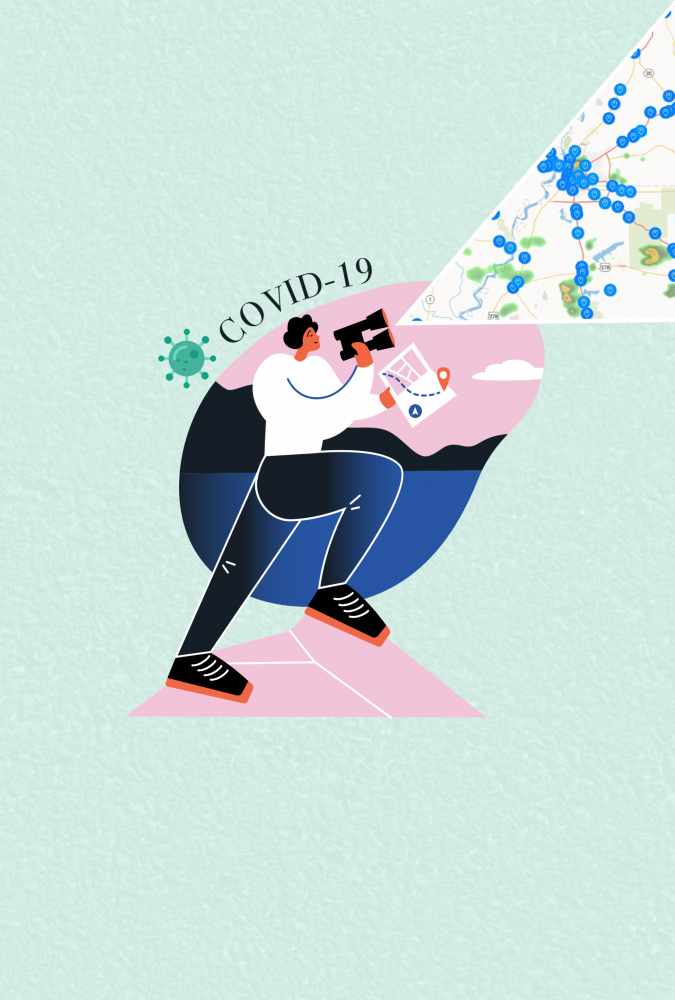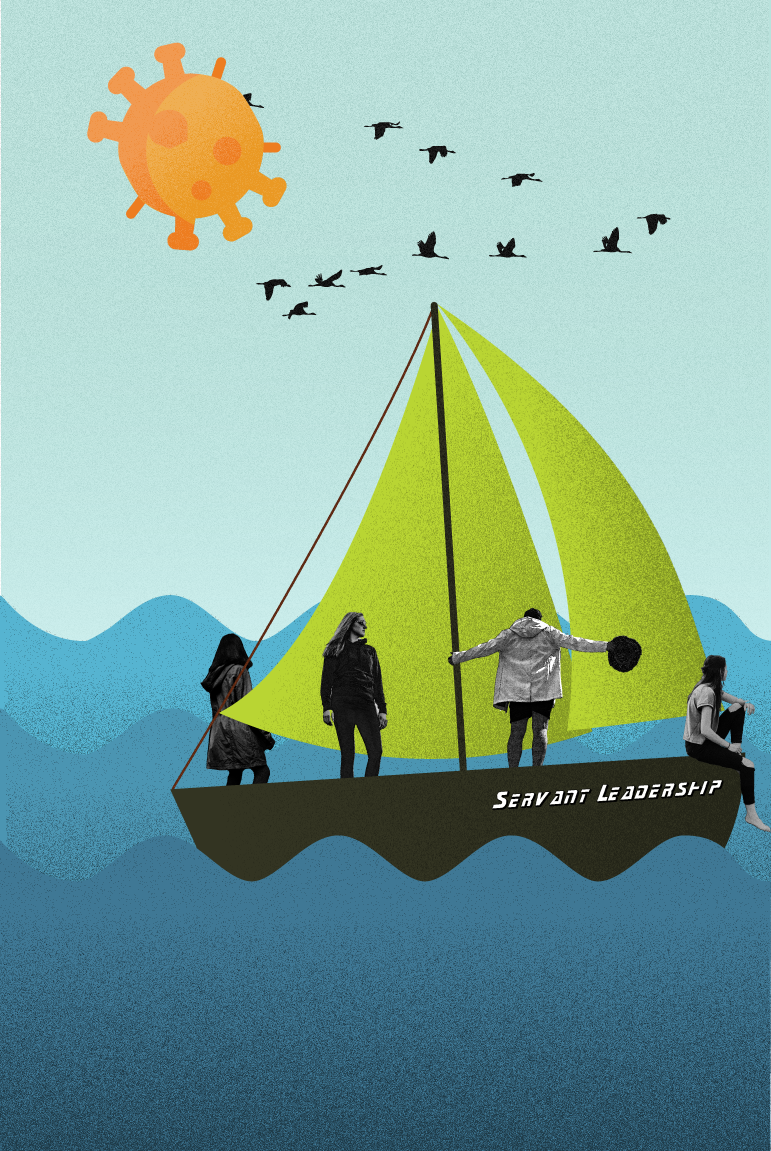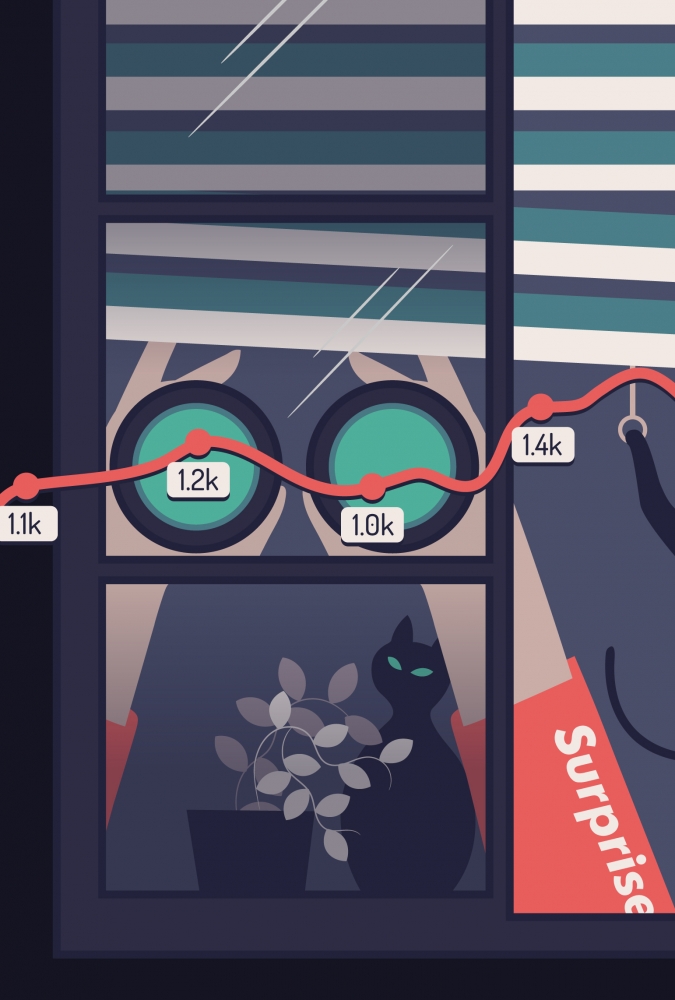 We recently chatted with James to learn more on how genetic-editing is stepping towards a future that could prevent disease-causing genes, and its emergence in the biotech startup scene.
We recently chatted with James to learn more on how genetic-editing is stepping towards a future that could prevent disease-causing genes, and its emergence in the biotech startup scene.
James Dahlman is a biomolecular engineer whose work lies at the interface of chemistry, nanotechnology, genomics, and gene editing. As a result of this work, James was named the #1 innovator of MIT’s 35 under 35 list for 2018. He has won many national and international awards, and has published in Nature Nanotechnology, Nature Biotechnology, PNAS, ACS and many other renowned journals.
What is CRISPR?
CRISPR (clustered, regularly interspaced, short, palindromic repeats) is the latest development in genome editing techniques—essentially, it allows you to easily edit DNA. Since many diseases are caused by mutations in DNA, CRISPR can be used to treat diseases at their source. Of course, this comes with its own set of implications.
Let’s say a mutation in your DNA is causing a tumor to grow; CRISPR can edit the mutation. Say a tree is dying because a specific type of beetle is eating it. CRISPR can edit the DNA to make it unappealing for that beetle to eat. Finally, imagine you are a scientist studying Alzheimer’s. You can edit different genes in cells and then quickly run experiments to see which genes cause the disease. This helps scientists and companies come up with better drugs more quickly. There are many other examples—CRISPR has been used in yogurt production, for example, to protect against viruses that can infect the yogurt-making bacteria.
Can you tell us about CRISPR-Cas9, your newest editing method? How has its emergence contributed to the cycle of innovation in the biotech scene?
CRISPR, the most recent development in genome-editing technology, is much easier to use than previously employed methods, like TALEN and ZFN. In my case, as a new postdoc with no previous experience, I was able to edit my first gene using CRISPR within three weeks of joining the lab.
As CRISPR is easy to learn, many labs and companies have already tried it out. As a result, the field has progressed far more quickly than any other scientific field I’ve been exposed to. That being said, the pioneering work done by the scientists that worked with methods like ZFN and TALEN laid the foundation for CRISPR scientists like me—my work would not be possible without those previous developments.
How do you think CRISPR will change our markets?
The answer to that question lies at the intersection of new scientific advances, fluctuating market forces, the overall public perception of gene editing, and even politics. Put another way: I have no idea. That being said, the potential for CRISPR to make many processes more efficient is substantial.
Say a tree is dying because a specific type of beetle is eating it. CRISPR can edit the DNA to make it unappealing for that beetle to eat.
What role do startups play in CRISPR? How about with SBIRs?
Startups play a very important role in CRISPR. Editas, Intellia, and CRISPR Rx are three large startups developing CRISPR-based drugs for cancer and genetic disease. Other therapeutic startups include Caribou and GenEdit, among others. Finally, there are many companies that are using CRISPR for non-therapeutic reasons, like in the case of agriculture.
While SBIRs are always important, CRISPR is hot enough that other capital sources are diluting their effect. Capital sources include high net worth individuals, VC firms, and large companies, which either partner with a CRISPR-focused company, or develop their own internal CRISPR capabilities. Finally, some CRISPR companies have gone public, so they are raising capital directly from the marketplace.
How do you raise startup capital in the biotech industry?
Raising startup capital in biotech is expensive. The experiments, machines, and physical infrastructure—like chemical safety hoods, for example—are costly. Because the burn rates for startups tend to be high, founders frequently look for large amounts of money. The numbers vary, but some companies might need to raise between $15M to $80M just to generate enough data in order to start a clinical trial. Luckily, there are VC firms and large strategic partners that have the experience and resources to support biotechs.
Biotech startups also have to deal with non-market risks associated with biomedicine. Theranos is a famous example of a biotech startup that promised X, when their science only supported Y.
One brutal reality of biomedicine is that DNA, cells, mice, and tumors do not care how trendy your idea is, how much you want it to work, or how well you can sell it. I’m still new to company creation, but when I start my first company, one of our core tenets will be optimism tempered with realism. What can our technology actually do? If we want to do something else, can we actually get there using our available resources? I often tell my students to be optimistic—but not to believe in magic.
I also think a lot about heuristics, and how we interpret information. Like all people, my brain wants good news. In biomedicine, it is imperative to remove desire from the experimental outcome, so you can objectively interpret data, even when results are bad. That is hard to do. One thing that helps is before I look at data, I actively remind myself that nature is the most beautiful thing I have ever known, and therefore, the scientific truth is what I want to see. I know it sounds cheesy, but reminding myself that truth is beautiful helps me interpret data objectively; it helps shift the focus away from what I ‘want’ the outcome to be.
How do you ‘sell’ science?
In a perfect world, science would sell itself. At its core, science is a humble way of looking at the world. When you meet a scientist, remember their job is to observe nature. They are just ‘observers.’
I observe how the genome works, and then I use my observations to treat disease. Some of my colleagues observe stars, and use their observations to study the origins of the universe. Others observe chemical reactions, and use their observations to make heart stents, waterproof fabrics, or lighter airplanes. Every scientist you meet is just a person who loves observing one small sliver of nature.
Having said that, science is under attack for reasons I still do not understand. Global warming is an excellent example. Scientists agree the world is warming up, and that we will all suffer as a result. This is sad, and the effects won’t take place for a while, so we like to ignore it. Unfortunately for our grandchildren, the atmosphere does not care whether or not we ‘believe’ in global warming.
I wish scientists stood up more directly. In the case of global warming, leaders who publicly deny global warming as a reality are outright lying. And when they lie, they are being immoral. Everyone who is reading this sentence should know: You may not pay the price, but your grandchildren (and mine) will. If you have been told global warming is not real, you have been lied to. I wish global warming was fake; that would be amazing! But it is real. And scientists need to be more clear and direct when talking about it.
Are there any standouts within the US who are leading the game in terms of innovation in biotech?
A lot of innovation in biotech is occurring in universities and startups. There are great researchers in universities all over the US. San Francisco and Boston have a particularly high density of innovative labs, since they are each home to so many leading universities. But really, there are excellent researchers everywhere.
My lab at Georgia Tech is in Atlanta, and many of my Georgia Tech and Emory Medical School colleagues perform cutting edge biotechnology research. I have colleagues who do great work in New York, San Diego, Los Angeles, Raleigh Durham, Austin, Columbus, Pittsburgh, Philadelphia, and any city with a research university. The situation is similar for startups. The biggest biotech startup hub right now is Boston, but there are great startups all across the US.
It’s often said that CRISPR is a generally cheaper, more affordable science for people to get into. Is this true? How does this affect the amount of startups entering CRISPR?
CRISPR is cheaper and easier than most biomedical assays—as a result, many biotechnology companies and startups use it. Sometimes, CRISPR is the goal—for example, to make a CRISPR drug. But more often, CRISPR is just a tool—for example, as a way to study the genes that will make our drug safer.
It’s important to note that CRISPR is still expensive on an absolute scale. It’s a biomedical technique, so it’s not cheaper than coding, for example.
There are a lot of moral implications surrounding CRISPR. Would you say the risks of big businesses funding CRISPR efforts outweigh the benefits?
That’s a rather broad question.
Is this a necessary risk for science to take?
That’s certainly an interesting way to phrase the question. First and foremost, scientists should always think about the implications of their work. If I were a scientist in the 1940s, and I had to choose between Robert Oppenheimer (who said after Germany lost the war we should stop developing the atomic bomb) and Edward Teller (who said we should make hydrogen bombs because we can), I would strongly side with Oppenheimer. Teller’s “gauge argument”—the premise that scientists make the stuff and society chooses what to do with it—has always seemed naïve to me.
With that said, I do not view CRISPR as a risk. We have been altering genomes forever. Since the dawn of agriculture, we have been choosing “better” plants and propagating them. Every “purebred” dog you see is the result of humans choosing a genome. CRISPR does the exact same thing; we’re just better at controlling the gene we want to change.
It’s also important to clarify one other thing: CRISPR is not the first time we’ve been able to control genes using biotechnology. We’ve had the ability to clone genes since the 1970s.
Finally, I have heard concerns about CRISPR being used to create superbugs. Superbugs and pandemics concern me a lot. In fact, if I “stay up at night,” it’s because I’m thinking about how scary these things are. But, they are created naturally—not by CRISPR.
For example, there is a terrifying gene named NDM-1, which makes bacteria resistant to many drugs. NDM-1 is spreading around the world. However, NDM-1 was not created by CRISPR—it was created naturally, years ago, by overusing antibiotics and human crowding. In fact, one of the best chances we have against superbugs is in developing CRISPR-based drugs.
Celebrating what I control — and ignoring the things outside of my control—helps me persist in biomedicine, somewhere even great scientists fail at 95% of the time.
Can you name an innovator who has been influential and inspiring to you and what you do?
I have always loved science, so there are too many to name—but I can try. When I was a teenager, while on vacation I’d read books about special relativity. I idolized people like Einstein and Richard Feynman because they only cared about truth. They were renegades; they only cared whether or not their work was correct. That was so cool.
When I went to graduate school at MIT, I had the fortune of getting my Ph.D. with Professor Robert Langer. He is a pioneer. Recently, for his 70th birthday symposium, Bill Gates sent him a personal ‘Happy Birthday’ video. Professor Langer is not only kind and generous to others—he taught me to believe in myself. Most importantly, he taught me to study what I love. To this day, if I don’t truly love the research, I don’t do it—end of discussion.
Finally, I want to highlight Professor Feng Zhang. I studied with him as a postdoc, immediately before starting my lab at Georgia Tech. Professor Zhang is an incredible scientist; his ability to identify the underlying problems in a field (especially those that are so painful no one wants to talk about them) and design experiments to solve those problems is incredible. At the age of around 35, he has already made a huge impact on biomedicine. Like Professor Langer, over the course of his career, I imagine Professor Zhang will become one of the most famous biomedical scientists in history.
Can you give us one work or life hack you use to succeed on a daily basis?
I focus on a lot on mental health. Specifically, I practice mindfulness. I cannot overstate how important this is for me. It helps me focus on task A when I am doing task A, rather than worrying about task B while trying to do task A.
The second hack is celebrating the little victories I can control. For example, when I submit a paper or grant, I celebrate with my wife—this involves smoked chicken wings and ribs from DBA BBQ in Atlanta. The key is celebrating when I submit the paper or grant, and not when it is accepted—since I can’t control what the reviewers think of the work; I can only control what I submit. Celebrating what I control—and ignoring the things outside of my control—helps me persist in biomedicine, since it is common even for great scientists to fail 95% of the time.
I should also say that these tricks—along with many others—come from my wife, Jordan, who is a professor at Emory Medical School. So, if you can marry a partner who is amazing in general and also happens to be a world expert on mental health—do that.
Keep up with James on LinkedIn and Twitter
Illustrations by Katarzyna Księżopolska


